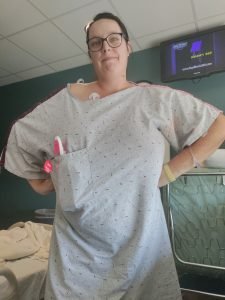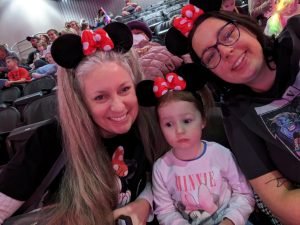 On October 9, 2022, I was 26 years old and had a stroke.
On October 9, 2022, I was 26 years old and had a stroke.
I was taking a nap, and I woke up to go to the bathroom. While in the bathroom, I suddenly got very dizzy and lost feeling on my right side. Before I could think of calling for help, I collapsed. I want to share my story so that others can learn of the warning signs as strokes are not just for those you would consider elderly. In fact, according to the American Heart Association, one in four adults over the age of 25 will have a stroke in their lifetime.
I was lucky that my mom was staying with us at the time and she found me on the bathroom floor. My husband rushed in and discovered I was paralyzed on the right side of my body and couldn’t speak, which are some of the signs of a stroke. It was a very bizarre experience because mentally I was fully aware of everything that was happening. I remember being so scared because I couldn’t tell them what was wrong. My mom called 911 right away (so important to do) and the ambulance arrived soon after. The medics kept asking me questions on the way to the ER, none of which I could really answer. I was frustrated, but found that I could say, “okay.” So that’s what I did, they asked me yes or no questions to which I responded “okay” and either nodded or shook my head.
When I arrived at Overland Park Regional Medical Center (OPRMC), I was immediately taken back for tests. I don’t actually remember the tests happening, but I remember being in the room with lots of doctors, medics and my husband. The doctor told my husband that I was having a stroke and there was a massive, one-centimeter blood clot in my brain.
While they typically give medication to treat blood clots mine was so severe that I would need surgery immediately and would have to be transferred to Research Medical Center (RMC). As a Comprehensive Stroke Center, RMC handles the highest and most complex stroke cases so I knew I’d be in good hands. The ER team at OPRMC consulted with the neurology team at RMC and began to administer tPA or tissue plasminogen activator. When administered quickly after stroke onset (within three hours, as approved by the FDA), tPA helps to restore blood flow to brain regions affected by a stroke, thereby limiting the risk of damage and functional impairment.
Once I arrived at RMC’s Emergency Room, I was rushed into surgery. Within two hours of my stroke, I went to two ERs and into surgery which is amazingly quick – timing is so important when you have a stroke. Dr. Ashish Kulhari, a board-certified neurologist, performed a thrombectomy to remove the blood clot. I remember being put on a table with my head fixed to the table. Dr. Kulhari started talking to me, and he and the stroke team worked to insert a mesh device into an artery near my groin, then moved it up to the brain, and pulled the clot out.
I remember experiencing the absolute worst pain in my life. I felt an excruciating, almost stabbing feeling in my head. I was told to stay still, and I realized that at that moment, they were removing the blood clot from my brain. I immediately could move my right side. I was so relieved.
I then spent the next couple of days in RMC’s Intensive Care Unit receiving the absolute best care. I left the hospital with a walker and a very long road to recovery, but a plan to keep improving. My care team still has no idea what caused the stroke. I am still meeting with the rehab team regularly and having more tests done. I graduated from stoke rehab which includes physical therapy and occupational therapy, but I’m still doing speech therapy to work on memory and comprehension. 
This has had a tremendous effect on me as a mother of a 3-year-old daughter. It’s funny, I couldn’t remember my husband’s name after the surgery, but I immediately remembered my daughter’s name. I wasn’t able to take care of her after my stroke and had to put her in daycare, which was so hard for me because I had been a stay-at-home mom. I felt like I was failing my daughter. I finally realized that I have to accept the help to get myself better. I still experience bad days and struggle with post-traumatic stress syndrome, but my outlook on life has changed. I now spend every day like it could be my last and hope others can learn from my story. Know your numbers – blood pressure, cholesterol, blood sugar – and try to eat right and exercise.
And remember FAST: Face, Arms, Speech, Time to call 911. It can save your life.
Kayla Harkins lives in Olathe with her husband and daughter. Learn more about Kayla’s experience.
 HCA Midwest Health hospitals quickly and effectively treat strokes. Our highly trained emergency room (ER) specialists and stroke experts work to avoid lasting symptoms, permanent disability and loss of life. We provide a compassionate, fast response using the latest stroke treatment techniques and technologies. Learn more about stroke care at hcamidwest.com/stroke. HCA Midwest Health and the HCA Healthcare Foundation has partnered with the American Heart Association on the program “Getting to the Heart of Stroke” to provide health education efforts in Kansas City and 14 other local markets across the United States.
HCA Midwest Health hospitals quickly and effectively treat strokes. Our highly trained emergency room (ER) specialists and stroke experts work to avoid lasting symptoms, permanent disability and loss of life. We provide a compassionate, fast response using the latest stroke treatment techniques and technologies. Learn more about stroke care at hcamidwest.com/stroke. HCA Midwest Health and the HCA Healthcare Foundation has partnered with the American Heart Association on the program “Getting to the Heart of Stroke” to provide health education efforts in Kansas City and 14 other local markets across the United States.

















Attached is my gofundme, if people would like to donate. https://gofund.me/11ae8c7f